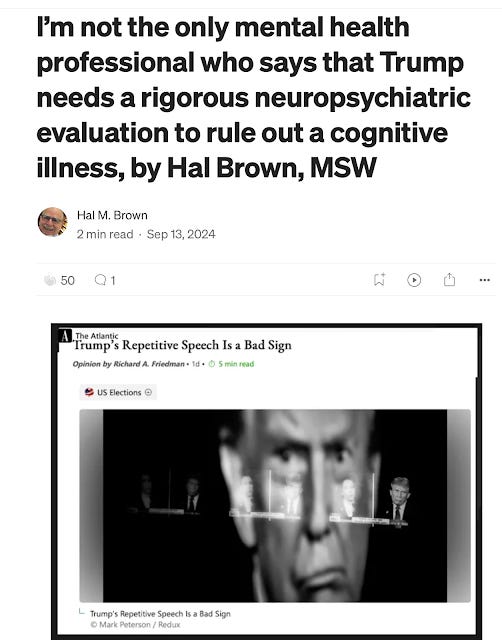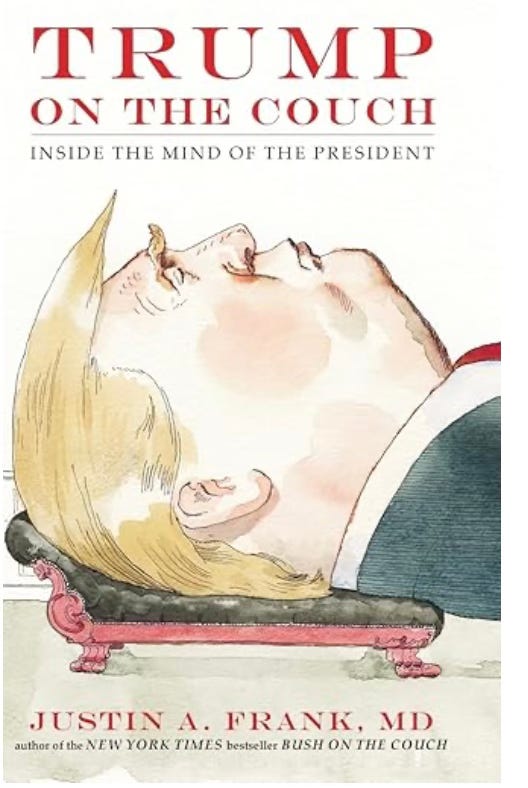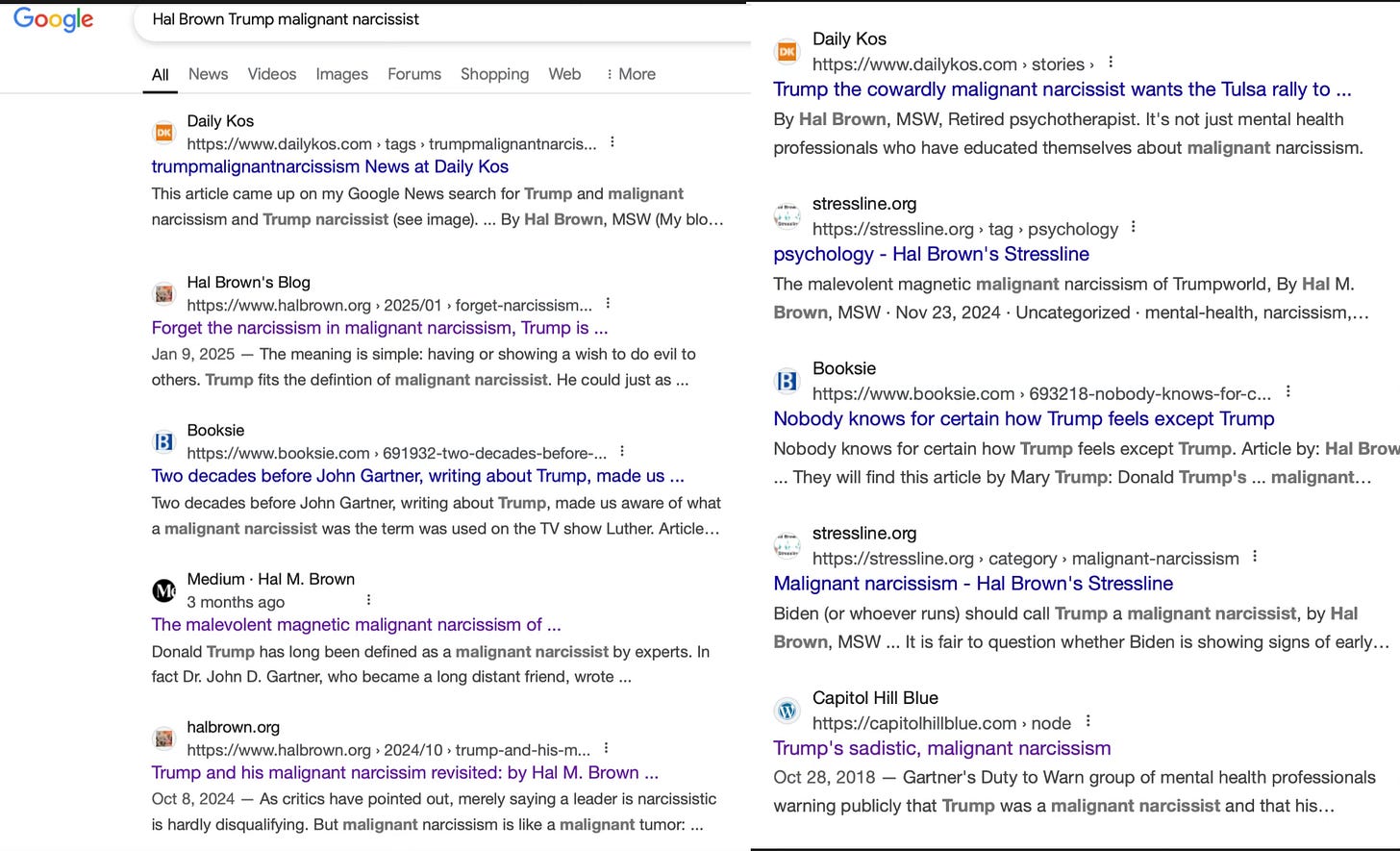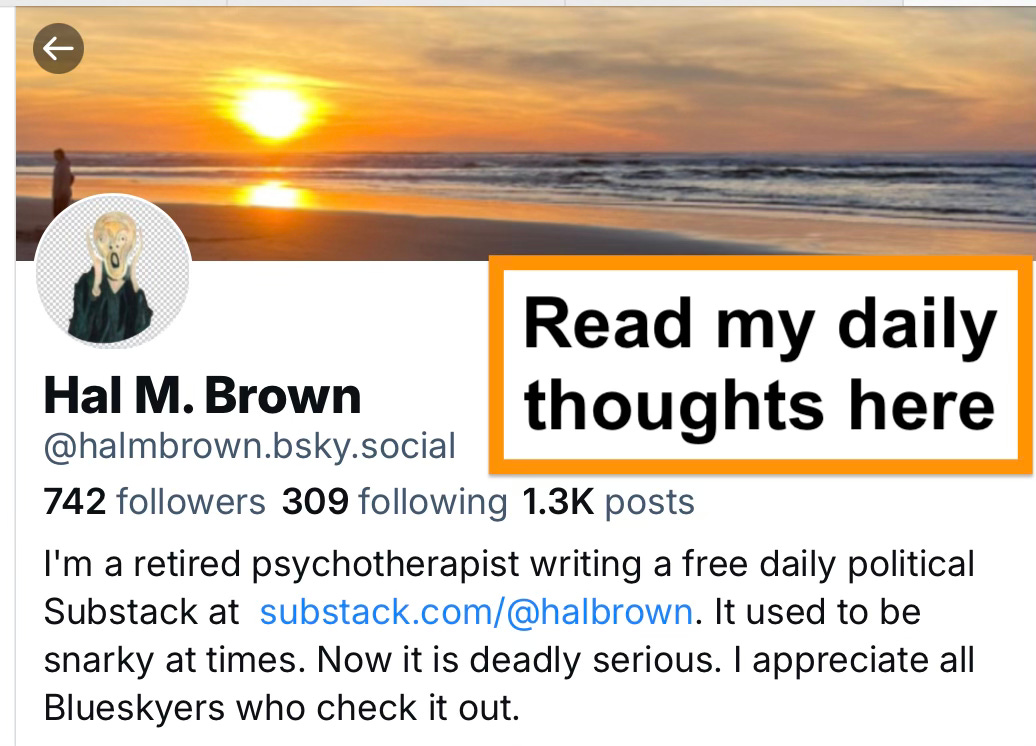Sometimes Occam’s razor can have two sides. When it comes to Trump’a increasingly bizarre behavior there are two, not necessarily mutually exclusive, simple explanations. His behavior is certainly consistent with his psychodamics, but how much of it is influenced by dementia? There are those who have jumped on a bandwagon of looking for evidence that he has dementia. They certainly have found it. However, there are other simple explanations for his unhinged behavior.
This morning Sabrina Haake wrote this in her Substack “Trade chaos wuth a side of dementia”:
Last year we had articles with titles like 'Without any doubt': Experts say Trump shows 'staggering' signs of 'cognitive diminishment' . They didn’t leave any room for doubt. I had my doubts then and despite a chorus of people, some self-described experts and lay people, saying Trump has dementia I am have my doubts.
I am posting this as counterpoint to Sabrina Haake’s Substack and to the argument of Dr. John D. Gartner, founder of Duty to Warn, who she uses an expert source. Gartner, Wiki tells us, specialized in the treatment of borderline personality disorder, bipolar disorder and depression. Haake’s other expert source is psychologist Suzanne Lachmann who wrote in Newsweek “Donald Trump Dementia Evidence 'Overwhelming.” Dr. Lachmann, per her website, works with adults and late adolescent patients with conflicts including relationship issues, trauma, struggles with self-esteem, body image, trust, depression and anxiety.
In my practice I worked with adults with a variety of common psychiatric disorders, but have had experience working with those with complex dissociative disorder (multiple personality disorder) and Vietnam combat vets with PTSD. I never treated anyone with dementia, though (as noted below) I did correctly diagnose two patients with temporal lobe epilepsy.
I wrote the following on Jan. 3rd, 2025. I have not significantly changed my opinion.
Most mental health professionals who are saying this are not neurologists, let alone neurologists who specialize in dementia.
Many mental health professionals are absolutely, positively convinced Trump has dementia. I seem like a lone voice among them saying we need more evidence.I am not an expert, but because I live in a continuing care retirement community I have seen a lot of people with dementia in all stages.
In my training there was no mention of considering dementia in making a differential diagnosis. In my 40 years of practice I never treated anyone with dementia. I did, however, have three clients who I thought had temporal lobe epilepsy which I knew about having read the book “Seized” by Eve LaPlante. I referred them to a behavioral neurologist who did sleep deprived EEGs with them and it turned out two of the three did have this disorder. When I began practice nobody was conversant about another brain disorder, the autism spectrum. My point is that mental health professionals must be aware that there are sometimes physiological and neurological explanations for behavior. This certainly applies to trying to discern explanations for what seems to be aberrant behavior in Trump. The unanswered question is whether is this behavior psychological, physiological, or a combinaiton of the two.
I have seen the photos and illustrations of Trump’s leaning forward posture countless times as if this was absolute proof of dementia. Lots of people his age stand that way at times.
His word salad could be an indication of mania, not dementia, or it could be, as he claims, a kind of improv which he calls the weave.
Many mental health professionals are digging in on the Trump dementia position. I think this is, in a way, wishful thinking couched in science.
We, meaning shrinks, have all the evidence we need to say Trump is a malignant narcissist, but then perhaps desperate to find more to justify saying Trump is unfit, they added dementia to bolster the argument that he was dangerous. I think mental health professionals need to be more self-critical and open minded in our judgments and not succumb to confirmation bias. It is easy to cherry pick from all the evidence when there’s so much Trump, Trump, Trump just about every hour of the day.
Is anybody keeping track of every bit of Trump’s behavior to find indications that he doesn’t have dementia?
We have ample examples of Trump going on for one or two hours without exhibiting any unambiguous signs of dementia. Much of his extemporaneous sidetracking can just as easily be considered a manifestation of his malignant narcissism as of dementia.
There’s currently a Change.org petition online “Our Diagnostic Impression of Trump is Probable Dementia: For Licensed Professionals Only.”
The petition begins:
We, the undersigned licensed medical and mental health professionals (INCLUDE YOUR ADVANCED DEGREE IN YOUR LAST NAME WITH NO PUNCTUATION) concur: From our years of training and experience, we are convinced that, while a definitive diagnosis would require further testing, Donald Trump is showing unmistakable signs strongly suggesting dementia, based on his public behavior and informant reports that show progressive deterioration in memory, thinking, ability to use language, behavior, and both gross and fine motor skills.
I highlighted the part that jumps out at me. First, the “years of training and experience” should apply to those who were in fields like neurology, particularly behavioral neurology, and neurosciense. It is true that a definitive diagnosis would require testing, however the use of the word “unmistakable” along with “strongly suggesting” shows a bias. Leave that word out and I can accept this sentence.
The petition then goes on to list diagnostic indices in these categories:
1) Decline from baseline
2) Memory:
3) Language
4) Motor:
5) Behavior:
The list reads like someone went over a text on dementia and then found things in Trump’s behavior and managed to make a case that he had this disorder. It wasn’t that long ago that splotches seen on Trump’s hands during the E. Jean Carroll led to rampant speculation that he had syphillis. Even before that the syphillis theory was in the news and no social media. This was from 2017: Trump’s ‘Unhinged’ Behavior Could Be Due To ‘Untreated Syphilis,’ Expert Claims. There is a reasonably good case to be made that Trump might be suffering from some stage of dementia. However, reasonably good isn’t good enough as far as I am concerned.
I think the list lacks the scientific rigor necessary to reach a foregone conclusion. This being said, I agree with the conclusion whether or not he has dementia:
This represents a unique danger because of Trump’s pre-existing Malignant Narcissistic Personality Disorder. As he continues to deteriorate he will become even more erratic, impulsive, paranoid, and aggressive than he already is. A demented malignant narcissist as president of the United States would have unimaginably catastrophic consequences.
Not only is Trump unfit, but he cognitively incapable of carrying out the duties of president. Under normal circumstances, relatives of such a patient would be seeking consultation with experts, and considering long term care, as he continues to deteriorate.
We feel an ethical obligation to warn the public, and urge the media to cover this national emergency.
The media must report objectively on anything that suggests Trump may have a cognitive impairment and bring in true experts from the appropriate fields. We can’t allow another Goldwater Rule fiasco to occur. When there were obvious examples of his being a malignant narcissist and mental health professionals spoke up about this they were debunked by many and accused of breaking some sacrosanct professional rule.
Anti-Trumpers who make the news warning about the dangers of Trump wielding the power of the presidency have been accused of having a psychiatric disorder the name of which has been used to discredit them. You know what it is: Trump derangement syndrome. We must not feed into this narrative.
When mental health professionals go public about the possiblity that Trump has dementia they must do this by emphasizing that this is a possiblity not a certainty. They must write or speak with gravitas and always allow for the chance that they are wrong.
Time will be the ultimate decider regarding this since dementia always gets worse. There may come a time during his presidency that his symptoms are so obvious you don’t need to be an expert in dementia to reach this conclusion.
This is when the 25th Amendment becomes a real possibility. Then we will be dealing with J.D. Vance. Nobody has suggested he has dementia.
More of my thoughts on this subject:
This was in Salon (I’m the clinical social worker in the title): Clinical social worker: “With the Trump Bible, one must consider dementia”
I also wrote I’m not the only mental health professional who says that Trump needs a rigorous neuropsychiatric evaluation to rule out a cognitive illness.
—————————————————
Note:
I was one of the first members of Dr. John Gartner’s Duty to Warn group and an early signatory to his petition to remove Trump (Version One) under the 25th Amendment. This was because Trump clearly met the criteria for being a dangerous malignant narcissist, or as the titles of the books edited by psychiatrist Bandy Lee, indicate, that he was a dangerous case.
Trump, newly empowered, has emerged as an even more dangerous case. He is dangerous to democracy and the established social and legal norms which are the bedrock of our society. He has gone from being an exemplar of the Dark Triad to being one of the Dark Tetrad. This has sadism added to psychopathy, narcissism, and Machiavellianism of the Dark Triad. I wrote about this here:
When I look at Trump and try to understand him I do so through the lens of psychoanalytic theory. For example “Trump's tweets are a royal road to his unconscious. As usual Trump was up tweeting last night. Psychoanalysts gain insight into someone's unconscious, and the way their mind works by analyzing their dreams. We look at his tweets.”
Can Trump be showing signs of dementia. Of course this is possible. Can we be sure? I don’t think so. Since dementia always gets worse, if he has it, in time we will see it.

























